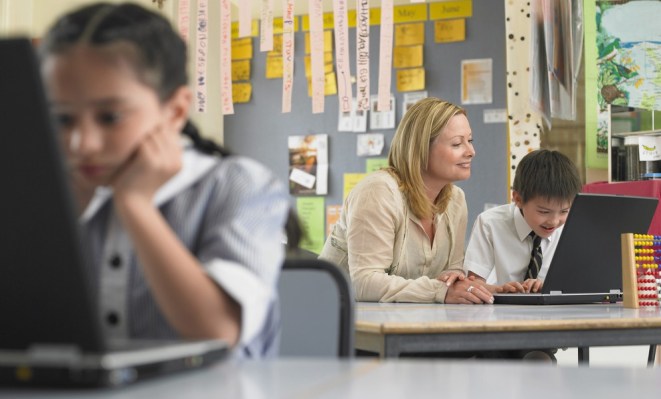Salesforce.com, one of the most visibly involved tech companies in San Francisco local politics and community, said it’s gifting $5 million to the city’s public schools and $1 million to Code.org for computer science education.
“We’re really doubling down on what we learned in our first year of creating digital classrooms and we’re really focusing on computer science,” said Salesforce.com Foundation President Suzanne DiBianca. Last year, the company’s foundation donated $2.7 million to the city’s middle schools.
The company’s CEO Marc Benioff has been one of the biggest proponents of community involvement in an era when local tech companies have become highly scrutinized for their role in driving living costs higher in the region. The company employs a “1-1-1” model where it has set aside 1 percent of its equity for a foundation, 1 percent of its employees’ time as community service and 1 percent of its product as a donation.
Not only has it been beneficial for local non-profits, it’s helped Salesforce do things like move its headquarters into what will eventually be the city’s tallest tower in 2017 without the kind of acrimony that companies like Twitter or Google have attracted. Overall, Salesforce has given out more than $68 million in grants, 600,000 hours of employee volunteer time and donated or discounted software licenses to about 23,000 organizations.
With this program, it’s setting aside 5,000 employee hours for volunteership in the city’s middle schools through tutoring, mentorship or field trip chaperoning, and they’re packing 2,000 backpacks for children.
The $5 million grant is the biggest one the company has made in education. Salesforce’s foundation has a grant-giving budget of $20 million per year.
Two of the $5 million will go toward a Principal Innovation Fund where school administrators will get to deploy the money in the way they see fit without any strings attached. The other $3 million will go toward funding full-time technology instructors and supporting 50 “digital classrooms” that are equipped with laptops. One hundred teachers will also go through professional development programs that will help them bone up on computer science or technology enablement in the classroom.
The key part here is that the effort will make computer science an elective in San Francisco’s middle schools. It had just been an after-school offering the year before.
“I’m still pushing for computer science to be added to the common core,” DiBianca said. “Some really large districts are shifting toward realizing that computer science is a really important skill and that they need to start teaching it at school. Some teachers are still trying to figure it out. They just need a little time. I have faith that we’ll get it done in San Francisco and if we keep taking important steps, we’ll be ready to go.”
Computer science education through programs like Code.org will help more of the local community participate and get jobs in a technology industry that they might otherwise see as insular.
